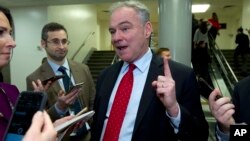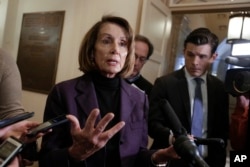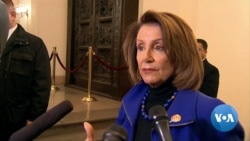The U.S. Senate is preparing for votes Thursday on separate Republican and Democratic proposals to end a partial government shutdown that is now in its second month.
A bill already passed by the Democrat-led House of Representatives would provide stopgap funding through February 8, allowing the shuttered agencies to reopen while the two sides debate border security. It does not contain money for President Donald Trump's desired wall at the U.S.-Mexico border.
The Republican plan is based on a Trump proposal to spend $5.7 billion on the wall and provide temporary protections for some immigrants. The White House said Trump is scheduled to discuss his plan Wednesday with conservative leaders as well as state and local leaders.
"Without a Wall our Country can never have Border or National Security," Trump tweeted Tuesday. "With a powerful Wall or Steel Barrier, Crime Rates (and Drugs) will go substantially down all over the U.S. The Dems know this but want to play political games. Must finally be done correctly. No Cave!"
Senate Majority Leader Mitch McConnell, who previously refused to bring up any bills that would not have Trump's support, urged lawmakers to vote in favor of the Republican proposal.
"The opportunity to end all this is staring us right in the face," McConnell said, describing the bill as "the only proposal, the only one currently before us that can be signed by the president and immediately reopen the government."
Democrats, who can block most legislation in the Senate, heaped scorn on the proposal, noting it would only temporarily suspend the threat of deportation for a fraction of immigrants brought illegally to America as children — a group placed at risk by Trump's own executive orders.
"The president's proposal is one-sided, harshly partisan, and was made in bad faith," Senate Minority Leader Chuck Schumer, a New York Democrat, said. "Now offering some temporary protections back in exchange for the wall is not a compromise, it's more hostage-taking…like bargaining for stolen goods."
"What the president proposed is granting what he had already taken away," House Speaker Nancy Pelosi said. "DACA recipients had their protections. The Temporary Protected Status, TPS, had their protection. The president took it away and now he's saying 'well I'll give you this back temporarily if you give me a wall permanently.' Open up government."
Pelosi said there is "no excuse" for Senate Republicans to not support the bill that has already passed the House, noting they previously supported similar legislation.
Republican Sen. Marco Rubio of Florida called for a compromise.
"This shutdown will tragically continue until there's another side willing to negotiate," he said. "It requires both sides to compromise. ... The president has taken the first step."
Even if the White House package cleared the Senate, it would be dead on arrival at the House. Pelosi has called it "a nonstarter" and promised House votes on border security bills that do not include wall funding.
McConnell cautioned Democrats against a rush to judgment on the Senate Republican bill.
"To reject this proposal, Democrats would have to prioritize political combat with the president ahead of federal workers, ahead of DACA recipients, ahead of border security, and ahead of stable and predictable government funding. Is that really a price that Democrats want to pay to prolong this episode?" he said.
While the Republican bill appears unlikely to become law, it could be a starting point for further negotiations and deliberations, said one Democrat.
"I do believe it is a proposal that deserves to be treated seriously," Virginia Sen. Tim Kaine said, adding that the bill should go through committee and be subject to amendments by senators of both parties in order to attract bipartisan support.
"These are issues we could debate. These are issues where amendments could be offered and we could find, I believe, a compromise," Kaine said. "We ought to have that discussion and offer Democrats and Republicans the ability to take some sandpaper to it and try to make it better."
The shutdown has furloughed 800,000 government employees, with at least 420,000 forced to continue working without pay and the remainder sent home, some of whom have been forced to look for temporary work elsewhere to help pay their household bills. All are set to miss their second biweekly paycheck on Friday.
WATCH: Shutdown continues
Some government services have been curtailed, as about 10 percent of airport security agents ordered to work have instead called in sick, some food inspections have been cut back, and museums and parks are closed. Federal courts could run out of money by the end of the month.
Meanwhile, the U.S. Supreme Court dealt the Trump administration a setback by saying it would not immediately act on an administration request to end the Deferred Action for Childhood Arrivals program started by former President Barack Obama that protects nearly 700,000 so-called "Dreamers" from deportation.
Michael Bowman on Capitol Hill and Steve Herman at the White House contributed to this report.


































